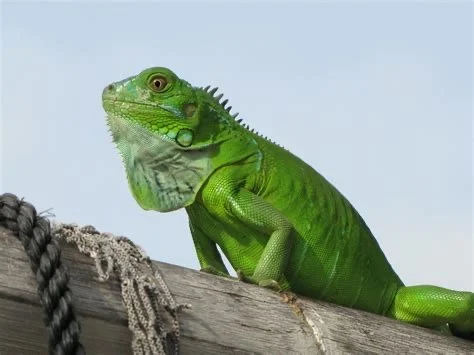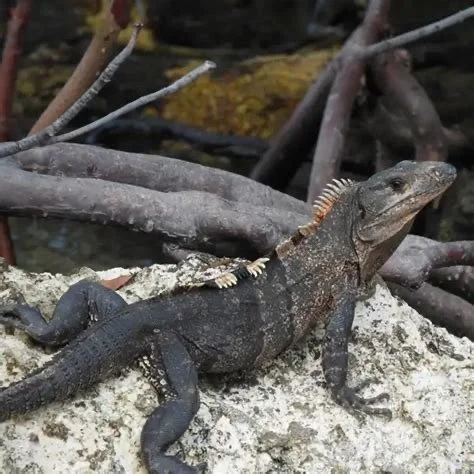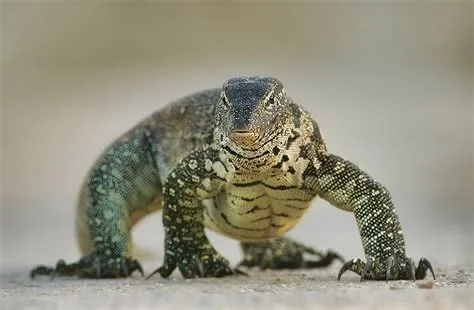🌴 Educational Resource: Invasive Lizards of Cape Coral
“(Safe • Humane • Professional — Protecting Your Property & Our Community)“
Our Approach
At Evict-A-Guanas, we believe in responsible solutions:
• No poisons, no cruelty — every removal follows FWC guidelines.
• Humane trapping protects the community while reducing invasive populations.
• Education + prevention ensures residents understand the importance of proactive action.
“We don’t hate iguanas. We simply know they don’t belong here — and left unchecked, they threaten our homes, our property values, and our native wildlife.”
The green iguana
While they may look tropical and harmless, the green lizard is Florida’s it’s a serious invasive pest. Growing up to 5–6 feet long with powerful tails and claws, these reptiles are expert climbers and burrowers. They love basking on seawalls, docks, and pool decks — exactly where they cause the most damage.
Why They’re a Problem:
• Structural Destruction: Their burrows weaken seawalls, sidewalks, canal banks, and home foundations. Left unchecked, this can lead to collapse or costly repairs.
• Real Costs: Cities like West Palm Beach have spent over $1.8 million fixing infrastructure failures caused by iguana burrows.
• Health Risks: Iguana droppings carry Salmonella, contaminating pool decks, patios, and docks where families walk barefoot.
• Landscape Loss: They devour flowers, fruit trees, and vegetable gardens—ruining yards and attracting more iguanas.
• Safety Concerns: Though not naturally aggressive, cornered iguanas can scratch, bite, or whip with their tails.
Why Leaving Them Alone Makes It Worse:
Letting iguanas roam freely might seem harmless, but every day they’re digging, dropping waste, and reproducing (females can lay up to 30–70 eggs at a time!). A “few iguanas” today can easily turn into hundreds on one property in just a few seasons, with damage escalating faster than homeowners realize.
Bottom Line: What starts as “just a lizard sunning by the pool” can quickly snowball into collapsed seawalls, cracked foundations, contaminated patios, and a backyard takeover.
Black Spiny-Tailed Iguana (Ctenosaura similis) — Cape Coral’s Rugged Rover
This rugged reptile features dark, rugged scales, a pronounced spiny crest down the back, and a thick, banded tail—making it easily distinguishable from the smoother-bodied green iguana.
Why They’re a Problem in Cape Coral:
• Stealthy Burrowers: They create extensive tunnels beneath seawalls, home foundations, and canal banks, leading to erosion and structural instability.
• Garden-Mailers: These iguanas shred ornamental flowers, yard plants, and crops, leaving landscapes stripped and vulnerable.
• Health Hazards: Their droppings may carry bacteria like Salmonella, scattering contamination across patios, docks, and pool areas.
• Defensive Behavior: While not intrinsically aggressive, they will bite, scratch, or lash their spiny tail when cornered or threatened—posing risks to pets and people.
Why Ignoring Them Is Risky:
“Letting one iguana roam free today can mean dozens of destructive burrows tomorrow.” Their reproductive speed, combined with evasive burrowing habits, means a seemingly harmless wandering iguana can escalate into a damaging colony if left unchecked.
The Nile Monitor Lizard (Varanus niloticus) — Cape Coral’s Top Invasive Predator
Why They’re a Problem: The Nile monitor isn’t just another nuisance lizard—it’s a large, aggressive predator that has made Cape Coral one of its main strongholds in Florida. These lizards can reach 5–7 feet long, are excellent swimmers, and thrive along Cape Coral’s canal systems, seawalls, and backyards. Their size, diet, and burrowing behavior make them one of the most dangerous invasive reptiles here.
The Problem with Nile Monitors: Predators of Pets & Wildlife
They prey on cats, small dogs, birds, turtles, burrowing owls, gopher tortoises, and even alligator hatchlings. This puts Cape Coral’s beloved native species—and family pets—at risk.
Burrow Damage & Erosion: Like iguanas, Nile monitors dig large burrows, but theirs are deeper and more destructive. Along Cape Coral’s canal banks and seawalls, this weakens structures, accelerates erosion, and creates hazards.
Rapid Population Growth: Cape Coral is estimated to have well over 1,000 monitors roaming freely. Females can lay 12–60 eggs at a time, which hatch into fast-growing young that spread through canals and yards.
Public Safety Risk: Though not usually seeking conflict, they will bite, scratch, or whip with their powerful tails if threatened. Their bite is strong enough to cause serious injury, and they are notoriously aggressive when cornered.
Difficult to Control: Nile monitors are smart, elusive, and fast—they can run, swim, and hide in burrows or canals quickly. Once established, removing them from neighborhoods is expensive and challenging.
Why Leaving Them Alone is a Mistake: A Nile monitor basking on the seawall may seem like just “another lizard,” but every one left alone is raiding nests, eating native wildlife, and burrowing into Cape Coral’s canals and seawalls. Their numbers grow every year, and ignoring them means more predators, more damage, and more risk to families and pets.
Bottom Line: The Nile monitor is Cape Coral’s most dangerous invasive reptile because it is big, aggressive, destructive, and breeding successfully in the canals. Unlike iguanas, which are mostly plant-eaters, Nile monitors are top-level predators—directly threatening Cape Coral’s wildlife, infrastructure, and safety.
Protecting Native Florida Wildlife
“Saving What’s Truly Ours”
Invasive lizards are more than just a nuisance — they threaten Florida’s most treasured native species.
• Burrowing Owls (Cape Coral’s official city bird) lose their nests to iguana and monitor burrows.
• Gopher Tortoises — a threatened species — are displaced or eaten.
• Sea Turtle Nests are raided by tegus and monitors.
Why We Can’t Just Leave Them Alone
It’s easy to think, “They’re not hurting anyone, let them be.”
But ignoring invasive lizards comes at a high cost:
• Structural Damage: Burrows hollow out the ground beneath seawalls, sidewalks, and foundations.
• Health Risks: Droppings spread bacteria like Salmonella where families gather.
• Explosive Reproduction: A single female can lead to hundreds within a few years.
• Wildlife Threats: These species push out or kill Florida’s treasured natives like burrowing owls and gopher tortoises.
The Real Cost of Ignoring Them
• Seawalls: Burrows cause erosion and collapses. HOA repair costs can climb into the hundreds of thousands.
• Landscaping: Yards stripped bare—fruit trees, vegetable gardens, and flowers eaten overnight.
• Wildlife Loss: Burrowing owls, gopher tortoises, and sea turtle nests destroyed.
• Pets & People: Large lizards can bite, scratch, or whip with their tails if threatened.
***Bottom Line: What looks like a $80 removal today could become a $75,000 seawall repair tomorrow.***
Our Approach: Safe • Humane • Professional
At Evict-A-Guanas, we believe in responsible solutions.
• No poisons, no cruelty — we follow FWC guidelines at every step.
• Humane trapping protects the community while reducing invasive populations.
• Education + prevention ensure residents understand why early action matters.
possible.
Our Humane Removal Methods (Explained)
🪝 Catchpole (Noose Pole) Capture
• Used when iguanas are visible and accessible.
• Reduces chase stress and risk to pets or landscaping.
• Humane, quick, and efficient.
🪤 Live Trapping (Cage Traps & Daytime Snares)
• Best for wary, nocturnal, or elusive iguanas.
• Checked at least every 24 hours by law.
• All trapped iguanas must be euthanized; no relocation allowed.
🎯 Humane Euthanasia with PCP Air Rifles (“Pellet Guns”)
• Required option in many cases where trapping/capture is impossible.
• Humane, immediate unconsciousness followed by AVMA-approved secondary step.
• Performed only where lawful and safe.
⚖️ Florida law requires all captured iguanas to be humanely euthanized. Relocation or release is prohibited.
Why Humane Euthanasia Is Required
• Florida classifies green iguanas as invasive.
• Captured iguanas cannot be relocated or released.
• Humane euthanasia is the only permitted outcome.
• No poisons are legal for iguana control.
What We Do Not Do
• ❌ Plug or collapse burrows
• ❌ Dig/excavate to search for eggs
• ❌ Perform landscaping, yard work, or alterations
Egg Policy:
• We remove visible eggs if seen during service.
• We do not dig into burrows to search for hidden eggs (to avoid property damage).
👉 If eggs are visible at time of service, we will remove them; we do not dig for hidden eggs.
Homeowner Education
We teach homeowners how to reduce attractants:
• Remove fallen fruit, bird feeders, pet feeders
• Secure outdoor pet food
• Reduce standing water / irrigation leaks
• Eliminate human food attractants (e.g., sauces, scraps)
We educate; we do not alter property!!!
⚠️ Important Disclaimer ⚠️
At Evict-A-Guanas, our services are limited to humane iguana removal only.
• 🚫 No burrow plugging or collapsing
• 🚫 No digging/excavating for eggs
• 🚫 No landscaping or property alterations
Protecting Florida’s Native Wildlife
Invasive lizards are more than just a nuisance—they endanger the very species that make Florida unique.
• Burrowing Owls (Cape Coral’s city bird) lose their homes to invasive burrows.
• Gopher Tortoises are displaced or eaten by predators.
• Sea Turtle Nests are raided by tegus and monitors.
What You Can Do
• Report sightings through FWC’s “I’veGot1” app or call us directly.
• Never attempt to handle invasive lizards yourself—they can injure and carry disease.
• Protect your property and HOA by acting early.
“Keeping Your Property Yours — Not Theirs.”
📜 Disclaimers & Disclosures
Effective Date: August 23, 2025
At Evict-A-Guanas, we are committed to transparency, professionalism, and compliance with all applicable laws and regulations. This page outlines important disclaimers and disclosures regarding the use of our website, services, and external content. By accessing this website, you agree to the terms below.
Copyright & External Content Disclaimer
• All photos, videos, articles, and external media displayed, embedded, or linked on this website that are not expressly created and owned by Evict-A-Guanas are the property of their respective copyright holders.
• Evict-A-Guanas does not claim ownership, authorship, or rights to any third-party content.
• Third-party content is provided strictly for non-commercial, educational, informational, and awareness purposes only, in accordance with the Fair Use provisions of U.S. Copyright Law (17 U.S.C. § 107).
• All copyrights, trademarks, and logos remain the sole property of their respective owners.
Fair Use & Educational Purpose
The inclusion of external videos, photos, and references is intended solely for:
• Public awareness of invasive species in Cape Coral and Southwest Florida.
• Educational discussion of ecological and property impacts.
• Community outreach regarding humane and safe solutions.
No copyright infringement, plagiarism, misrepresentation, or unauthorized commercial use of third-party content is intended.
Contact for Copyright Concerns
If you are a copyright holder and believe your content has been used improperly or without adequate credit, please contact us immediately:
We will review your concern promptly and, if necessary, remove or adjust the material in a timely and respectful manner.
Wildlife Handling Disclaimer
Evict-A-Guanas provides licensed and humane wildlife removal services in accordance with Florida Fish and Wildlife Conservation Commission (FWC) guidelines.
Residents, HOAs, and property owners should not attempt to capture, trap, or handle invasive lizards themselves, as these animals may carry disease, cause injury, or create unsafe situations. Always contact a licensed professional for assistance.
Health & Safety Disclaimer
Invasive lizards are not venomous, but they may carry bacteria such as Salmonella and other pathogens that can pose health risks to people and pets. Droppings left on patios, docks, boats, and pool areas should be treated as potential contamination hazards.
Evict-A-Guanas advises residents to exercise caution and seek professional services for removal and sanitation concerns.
Service Limitations Disclaimer
The educational content provided on this website is intended for general awareness only. Each property and situation may vary, and results of wildlife removal cannot be guaranteed due to factors outside of our control (such as re-infestation, environmental conditions, or surrounding populations).
For property-specific solutions, please schedule a professional inspection with our team.
External Links Disclaimer
This website may include external links, embedded videos, or references to third-party content. These are provided strictly for educational and informational purposes.
Evict-A-Guanas is not responsible for the accuracy, reliability, or policies of external websites or content providers. The presence of such links does not imply affiliation, endorsement, or partnership.
Limitation of Liability
By using this site, visitors acknowledge and agree that Evict-A-Guanas:
• Assumes no liability for copyright infringement claims, intellectual property disputes, or damages arising from the use of third-party content.
• Assumes no responsibility for injuries, property damage, or health issues that may occur if residents attempt to capture or interact with invasive lizards without professional help.
• Provides all external content “as-is” strictly for educational purposes.
Thank You for Visiting
Thank you for taking the time to visit our educational resource page. We truly appreciate your interest in learning more about the invasive lizard challenges we face here in Cape Coral and throughout Southwest Florida.
At Evict-A-Guanas, we believe that education is just as important as action. By understanding the risks these species pose—and the importance of safe, humane solutions—we can better protect our homes, our communities, and the wildlife that makes Florida so unique.
Your time and support mean a great deal to us. Together, through awareness and responsible management, we can ensure that our properties remain safe, our seawalls strong, and our local ecosystems preserved.
If you have questions, concerns, or would like more information, please don’t hesitate to reach out—we are here to help.
Evict-A-Guanas — Safe • Humane • Professional Service You Can Trust




